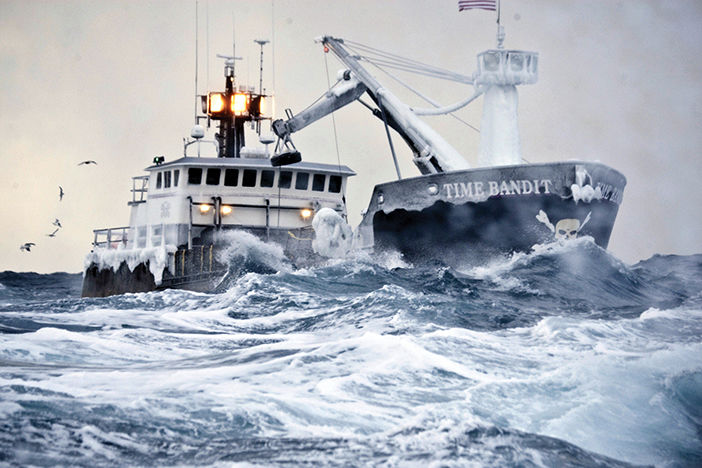Of the myriad “guilty” pleasures I spend entirely too much time watching on television, the reality show “Deadliest Catch” (Discovery Channel) seems to have the strongest pull on me.
I had stayed away from the show for a while, but the new season premiered and before I knew it, I was wasting a sizeable amount of my time being totally entranced by the men who make a living daring the Bering Sea to give them the “best” she’s got.
A lot of times, the Bering Sea obliges, and the best she’s got makes life at sea a living nightmare for these crews; things do not always end happily.
Commercial fishing is always listed among the top 10 most dangerous jobs in America. If you were a commercial fisherman in 2008, you had a fatality rate five times that of truck drivers, eight times that of police officers and 19 times that of firefighters.
“Deadliest Catch” has been on for years, so the answer to the quandary of just how long people (like me) can watch crab pots get tossed overboard and then hauled up is still an open question.
The captains and the crews of these crab boats have become real stars with their own fan bases, even though they are an extremely tough and not so politically correct lot.
“Deadliest Catch” can sometimes feel like a silent movie, as Discovery Channel censors work overtime bleeping out every second word during an angry captain’s tirade against a mechanical breakdown, the crab not climbing into crab pots fast enough or a particular crew member not pulling his weight.
It’s a life not conducive to marriage vows, livers or lungs either, as there is enough drinking and smoking to give viewers a contact high. They also fight with each other, with other boats and with anyone or anything that seems to be handy. Yet they have moments of great tenderness, as when Captain Phil of the boat Cornelia Marie passed away a few seasons ago.
These men, who have begrudgingly let cameras invade their very personal space, seem to live lives devoid of any formal religious expression. This is not to say these men do not pray.
Just as someone said there will always be prayer in school as long as there is algebra, raging Bering Sea waves that tower over ships and toss vessels hundreds of feet long about like so many bathtub toys, will also always have the capacity to focus one’s attention on the possibility of the divine.
The apostles must have been tough guys too. In a lot of ways, they don’t act all that much different from the captains and crews on “Deadliest Catch.” They lived in a similar kind of fraternal order with its own rituals and codes — lived in close quarters with one another and faced the same dangers.
Granted, the Sea of Galilee may not have had the same kind of ferocity as the Bering Sea, but then again, the apostles did not have GPS, modern boat building materials or satellite communications to rely on if things went south.
And the apostles acted like tough guys. Cutting off the ear of a temple guard in an attempt to save the Savior is not the act of a guy who grazes at the salad bar section of the local vegan restaurant on the West Side. And Peter, the ultimate “skipper,” is a man of no half measures, whether he is denying Jesus during the passion or building his Church amid the danger and constant threat of death from Roman authorities — culminating with his wish to not be crucified “right side up” in deference to Master.
The apostles, like the guys in “Deadliest Catch,” formed a tight knit brotherhood. Both groups of fishermen experience family disagreements as well as bonds that are thicker than the water they traverse.
The apostles bickered among themselves as well. They debated who was the greatest among themselves and Peter vowed never ever to allow Jesus to wash his feet. There probably could have been a Fifth Gospel just filled with things these hard-headed fishermen from Galilee had to take back after their encounter with Jesus.
There is enough of their fisherman-like behavior recorded in the Gospels as is. But these were the men Jesus chose to build his Church upon. He could have chosen much more sophisticated men, even by first century Roman province standards.
But He chose hard men, men who knew danger and were rough around the edges.
Men who in their own very masculine way, knew how to love one another.
It may have taken the incarnate God to present himself to these fishermen on the banks of the Sea of Galilee to make them more refined and more committed to an open and overt presentation of religious depth … a luxury the men of the crab boats on “Deadliest Catch” do not enjoy.
I would guess to even suggest to any of the men featured on “Deadliest Catch” that they may have the mettle for discipleship would probably be received by a profane rant on how wrong I was, punctuated by a left hook to my face. Because Christianity is not a faith for the faint of heart, combining the verve of men of the sea with the grace of God could serve us all well and help transform us all into fishers of men.

